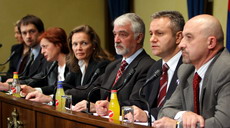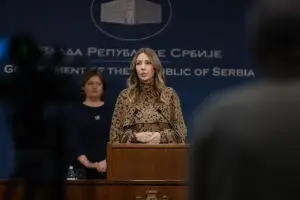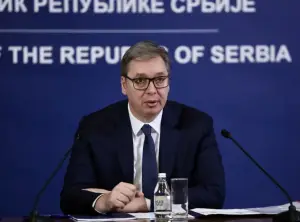Q:
A:
Agreement with IMF reached
Belgrade,
2 December 2005
Director of the International Monetary Fund (IMF) to Serbia-Montenegro Piritta Sorsa confirmed today that representatives of Serbia and the IMF reached a technical agreement on the sixth review, which should in turn be confirmed by the IMF Board of Directors in late January next year.
Sorsa said at a press conference at the Serbian government building in Belgrade that significant progress has been made in talks with Serbian representatives on the sixth review, and specified that two important steps made by the Serbian government, notably the adoptions of the 2006 budget and a package of health laws, contributed to the realisation of the technical agreement.
She said that there was a successful resolution to the issues remaining on the economic policy memorandum, and that there were also discussions on other open topics, such as the repayment of debt to pensioners.
“Since our estimate is that progress in the negotiations has been made, that will allow for the holding of a meeting with the IMF Board of Directors in late January next year, at which the agreement will finally be confirmed”, Sorsa said.
Serbian Deputy Prime Minister Miroljub Labus said that an ad referendum agreement with the IMF has been reached, which means that this agreement first has to be adopted by the IMF management, and then the Board of Directors.
According to Labus, Serbia has eliminated all obstacles to the completion of the sixth review and thus of the whole three-year arrangement.
Labus said that this is the first time that Serbia has a consistent programme spanning a period of three to four years, considering that in November 2001 an agreement was reached concerning the writing off of debt with the Paris Club of Creditors according to which 50 percent of the debt was written off, but as part of agreement the remaining 50 percent, nearly €7 million, was to be written off following the implementation of the IMF programme during the next three years.
Labus said that reaching this technical agreement is proof of the unique policy that has been implemented, therefore leading to the point where the state can finally resolve the issue of debt. He added that there are several particularly positive results of the three-year IMF programme that was implemented.
Labus said that the problem of external debt has been resolved, there is strong five percent annual economic growth, public financing has been consolidated, resulting in a surplus in that sector, major and very effective structural changes have been made and a new investment cycle has been initiated.
He recalled that in 2001, the state debt in domestic product was 140 percent, and now, when the last part of the debt to the Paris Club of Creditors will be written off, the percentage will be reduced by two-thirds to stand at 55 percent.
Labus said that the present government has this year succeeded in reducing the external debt of the state by $2.3 billion. A debt of $1.6 billion to the London Club of Creditors has been written off, and now $700 million debt to the Paris Club of Creditors is to be written off. He also said that the conditions in which the writing off of debt was negotiated were better than present market conditions.
Serbian Minister of Finance Mladjan Dinkic pointed out that now that the government has adopted the 2006 budget, as well as packets of laws on economy and on health, it is finally possible for Serbia to complete the talks with the IMF concerning the conclusion of the country’s economic and financial policies memorandum for the next year.
Dinkic said he is pleased with the agreement they have reached so far, and added that Serbia has fulfilled all conditions so that in late January 2006, the IMF board of directors can decide on the conclusion of the three-year arrangement.
If the board’s decision is positive, Serbia’s $700 million debt to the Paris Club of Creditors will be written off. Also, the Serbian central bank can withdraw the remaining loan tranche of $200 million that was to be used for filling the country’s foreign currency reserves, he said.
Dinkic pointed out that the board’s positive decision will also lead to additional improvement in the country’s credit rating.
“Our budgetary deficit stood at four percent of GDP, that is about 45 billion dinars, but we will finish this year with a surplus of 1.1 percent of GDP. Next year, the surplus will be even bigger – 2.5 percent of GDP”, the minister said.
According to Dinkic, the Serbian government’s basic aim when it comes to economic policy was to reduce the deficit in the current account of its balance of payment, as well as its foreign trade deficit.
Last year, Serbia’s deficit in the current account of its balance of payment stood at $3.3 billion. According to the latest prognoses regarding the first ten months of 2005, Serbia should start 2006 with a $2.1 billion deficit in the current account of the balance of payment, or $1.2 billion less than the previous year.
Dinkic explained that this reduction in deficit is a result of an increase in Serbia’s export, which will be 35 percent higher than last year.
She said that there was a successful resolution to the issues remaining on the economic policy memorandum, and that there were also discussions on other open topics, such as the repayment of debt to pensioners.
“Since our estimate is that progress in the negotiations has been made, that will allow for the holding of a meeting with the IMF Board of Directors in late January next year, at which the agreement will finally be confirmed”, Sorsa said.
Serbian Deputy Prime Minister Miroljub Labus said that an ad referendum agreement with the IMF has been reached, which means that this agreement first has to be adopted by the IMF management, and then the Board of Directors.
According to Labus, Serbia has eliminated all obstacles to the completion of the sixth review and thus of the whole three-year arrangement.
Labus said that this is the first time that Serbia has a consistent programme spanning a period of three to four years, considering that in November 2001 an agreement was reached concerning the writing off of debt with the Paris Club of Creditors according to which 50 percent of the debt was written off, but as part of agreement the remaining 50 percent, nearly €7 million, was to be written off following the implementation of the IMF programme during the next three years.
Labus said that reaching this technical agreement is proof of the unique policy that has been implemented, therefore leading to the point where the state can finally resolve the issue of debt. He added that there are several particularly positive results of the three-year IMF programme that was implemented.
Labus said that the problem of external debt has been resolved, there is strong five percent annual economic growth, public financing has been consolidated, resulting in a surplus in that sector, major and very effective structural changes have been made and a new investment cycle has been initiated.
He recalled that in 2001, the state debt in domestic product was 140 percent, and now, when the last part of the debt to the Paris Club of Creditors will be written off, the percentage will be reduced by two-thirds to stand at 55 percent.
Labus said that the present government has this year succeeded in reducing the external debt of the state by $2.3 billion. A debt of $1.6 billion to the London Club of Creditors has been written off, and now $700 million debt to the Paris Club of Creditors is to be written off. He also said that the conditions in which the writing off of debt was negotiated were better than present market conditions.
Serbian Minister of Finance Mladjan Dinkic pointed out that now that the government has adopted the 2006 budget, as well as packets of laws on economy and on health, it is finally possible for Serbia to complete the talks with the IMF concerning the conclusion of the country’s economic and financial policies memorandum for the next year.
Dinkic said he is pleased with the agreement they have reached so far, and added that Serbia has fulfilled all conditions so that in late January 2006, the IMF board of directors can decide on the conclusion of the three-year arrangement.
If the board’s decision is positive, Serbia’s $700 million debt to the Paris Club of Creditors will be written off. Also, the Serbian central bank can withdraw the remaining loan tranche of $200 million that was to be used for filling the country’s foreign currency reserves, he said.
Dinkic pointed out that the board’s positive decision will also lead to additional improvement in the country’s credit rating.
“Our budgetary deficit stood at four percent of GDP, that is about 45 billion dinars, but we will finish this year with a surplus of 1.1 percent of GDP. Next year, the surplus will be even bigger – 2.5 percent of GDP”, the minister said.
According to Dinkic, the Serbian government’s basic aim when it comes to economic policy was to reduce the deficit in the current account of its balance of payment, as well as its foreign trade deficit.
Last year, Serbia’s deficit in the current account of its balance of payment stood at $3.3 billion. According to the latest prognoses regarding the first ten months of 2005, Serbia should start 2006 with a $2.1 billion deficit in the current account of the balance of payment, or $1.2 billion less than the previous year.
Dinkic explained that this reduction in deficit is a result of an increase in Serbia’s export, which will be 35 percent higher than last year.
Speaking about paying out debts to pensioners, the government has agreed that instead of paying them out in bonds, the debt will be repaid in six cash instalments, starting from this December and lasting until July 2008, Dinkic said.
Dinkic also mentioned the state’s debt to beneficiaries of the farmers’ pension fund. The debt, incurred over the last 15 years, now stands at 20 billion dinars.
He said that thanks to radical changes in the sector of public finance in the last two years, conditions have been established for settling the debt towards retired farmers. The debt will be repaid in the period between 2007 and 2010.
The minister mentioned the last issue that remained unresolved before the arrival of Head of the IMF Mission to Serbia-Montenegro Piritta Sorsa – that of remunerations of employees in public companies.
“The agreement has been reached. The Serbian government just yesterday adopted a decision for approving guidelines for public companies according to which they can count on a 10.3 percent increase in salaries in the course of 2006”, said Dinkic.
Serbian Minister of Economy Predrag Bubalo said that the signing of the technical agreement with the IMF is another success for the Serbian government in a series of its activities in the current year.
Bubalo said that the plan, which was made in accordance with the IMF, envisaged 300 public auctions in the privatisation process. So far, a total of 365 auctions have taken place, while an additional four auctions are to take place in December, offering another 65 state-owned companies for sale.
The minister also said that 36 public tenders will have been announced in 2005, while in the previous three-year period only 40 tenders were announced.
Dinkic also mentioned the state’s debt to beneficiaries of the farmers’ pension fund. The debt, incurred over the last 15 years, now stands at 20 billion dinars.
He said that thanks to radical changes in the sector of public finance in the last two years, conditions have been established for settling the debt towards retired farmers. The debt will be repaid in the period between 2007 and 2010.
The minister mentioned the last issue that remained unresolved before the arrival of Head of the IMF Mission to Serbia-Montenegro Piritta Sorsa – that of remunerations of employees in public companies.
“The agreement has been reached. The Serbian government just yesterday adopted a decision for approving guidelines for public companies according to which they can count on a 10.3 percent increase in salaries in the course of 2006”, said Dinkic.
Serbian Minister of Economy Predrag Bubalo said that the signing of the technical agreement with the IMF is another success for the Serbian government in a series of its activities in the current year.
Bubalo said that the plan, which was made in accordance with the IMF, envisaged 300 public auctions in the privatisation process. So far, a total of 365 auctions have taken place, while an additional four auctions are to take place in December, offering another 65 state-owned companies for sale.
The minister also said that 36 public tenders will have been announced in 2005, while in the previous three-year period only 40 tenders were announced.













